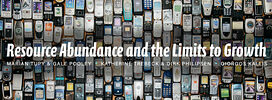Thank you to both Marian Tupy and Gale Pooley for their consideration of our response to their initial essay. And thank you too to the Cato Institute for instigating and facilitating the process—and to Giorgos Kallis for his essay and response. In an era often characterized by division rather than dialogue and by dogmatism rather than deliberation, this exchange is an important example of constructive conversation, of which more is needed.
I want to offer just a few reflections for now. I suspect where we disagree is sometimes less on broad reflections, but perhaps on nuance and implications. For example:
- A substantial section of my recent book, The Economics of Arrival, sets out many examples of the considerable progress humanity has achieved in recent decades, when the “fruits of growth” as my co-author and I describe them, have been used well. Almost every talk I give I start with this point—that progress has most certainly been achieved. Tupy’s response sets out many improvements I would certainly recognize and appreciate. For me, however, the Icelandic warning, borne of their experience of the Global Financial Crisis, of “success induced bias” is timely. Previous apparent improvements are not necessarily a foundation for carrying on with the same prescription.
- One of the nuances I would like to encourage is to look beyond averages—many of the signs of progress my colleagues offer in their response to Dirk Philipsen and me are averages or per capita statistics. The questions of distribution and its imbalances need to augment those averages in order to appreciate where resources are held, accessed, and utilized.
- Sometimes the world has produced enough in a macro sense, and now the question of how resources are shared and their quality comes to the fore. The issue of calories pointed to by Tupy is a case in point.
- We do not bemoan markets and explicitly recognize their merits (nor are we calling for a centrally planned economy). Nor do we place our unequivocal faith in them—there are simply too many examples where markets, left to their own devices, do not sufficiently reward activities with the most social value. The treatment and remuneration of key workers (whose social value has been highlighted during the pandemic) illustrates this—but there are many other examples.
- I would also suggest that democratic societies around the world repeatedly support the idea that some areas of life are not fit for allocation by markets—school-age education, health treatment, and so on. In a Wellbeing Economy markets would flourish—but in service of society, not the other way around. And without the power imbalances and rent seeking that characterize many of today’s markets.
- Many of the signs of progress our colleagues set out have been hard fought for by civil rights campaigners, advocates for expansion of democracy, agitators for women’s rights, and so on. The story is one of complex and dynamic political economy and struggle, and to place too much credit at the feet of markets or growth alone is to downplay these other dimensions.
Again, thank you for this conversation; I have learnt from all my fellow contributors and look forward to a time when we can perhaps take the conversation off paper (or computer screen) to an in-person engagement.

